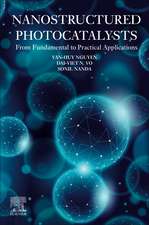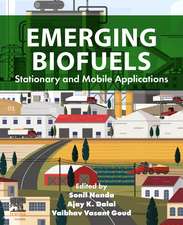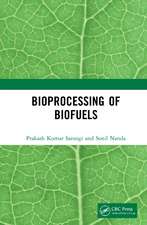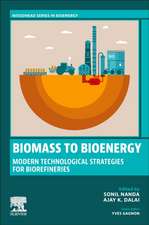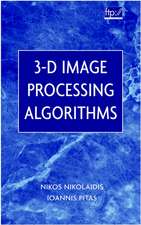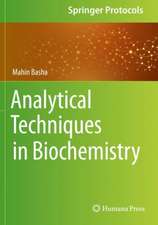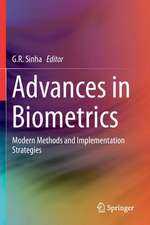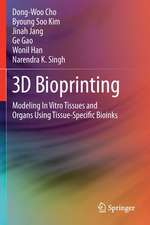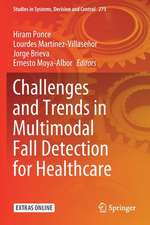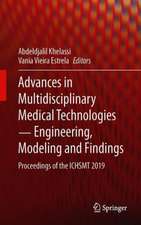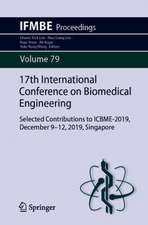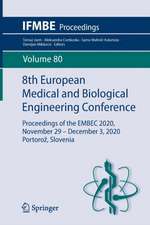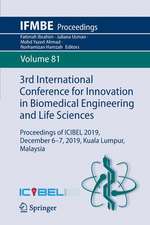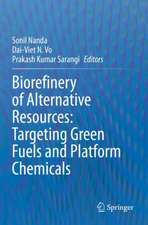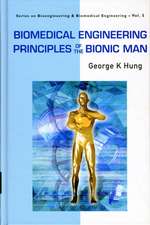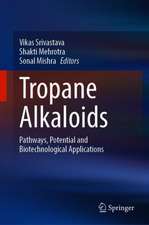Recent Advancements in Biofuels and Bioenergy Utilization
Editat de Prakash Kumar Sarangi, Sonil Nanda, Pravakar Mohantyen Limba Engleză Hardback – 15 oct 2018
| Toate formatele și edițiile | Preț | Express |
|---|---|---|
| Paperback (1) | 553.29 lei 38-44 zile | |
| Springer Nature Singapore – 16 dec 2018 | 553.29 lei 38-44 zile | |
| Hardback (1) | 659.70 lei 3-5 săpt. | |
| Springer Nature Singapore – 15 oct 2018 | 659.70 lei 3-5 săpt. |
Preț: 659.70 lei
Preț vechi: 776.13 lei
-15% Nou
Puncte Express: 990
Preț estimativ în valută:
126.26€ • 131.31$ • 105.65£
126.26€ • 131.31$ • 105.65£
Carte disponibilă
Livrare economică 22 februarie-08 martie
Preluare comenzi: 021 569.72.76
Specificații
ISBN-13: 9789811313066
ISBN-10: 9811313067
Pagini: 440
Ilustrații: XVII, 402 p. 81 illus., 55 illus. in color.
Dimensiuni: 155 x 235 mm
Greutate: 0.95 kg
Ediția:1st ed. 2018
Editura: Springer Nature Singapore
Colecția Springer
Locul publicării:Singapore, Singapore
ISBN-10: 9811313067
Pagini: 440
Ilustrații: XVII, 402 p. 81 illus., 55 illus. in color.
Dimensiuni: 155 x 235 mm
Greutate: 0.95 kg
Ediția:1st ed. 2018
Editura: Springer Nature Singapore
Colecția Springer
Locul publicării:Singapore, Singapore
Cuprins
Module 1. Acknowledgements.- Module 2. Preface.- Module 3. Foreword by Editor.- Module 4. List of abbreviations.- Module 5. Names and affiliations of contributors.- Module 6. Introduction to biomass and biofuels.- Module 7. Biomass conversion technologies.- Module 8. Energy storage, lifecycle assessment and socio-economic analysis.- Module 9. Appendices.- Module 10. Author Index.- Module 11. Subject index.
Notă biografică
Dr. Prakash Kumar Sarangi is a Scientist with specialization in Food Microbiology at the Central Agricultural University in Imphal, India. He has a Ph.D. degree in Microbial Biotechnology specialization from the Department of Botany in Ravenshaw University, Cuttack, India; M.Tech. degree in Applied Botany from the Indian Institute of Technology Kharagpur, India; and M.Sc. degree in Botany from Ravenshaw University, Cuttack, India. He has earlier served as an Assistant Professor and Research Officer at Rajkumar Academy of Bioinfotech & Research in Bhubaneswar, India; Visiting Faculty in Biotechnology at the Buxi Jagabandhu Bidyadhar College in Bhubaneswar, India and Visiting Faculty in the Department of Botany at the Orissa University of Agriculture and Technology in Bhubaneswar, India. Dr. Sarangi’s current research is focused on bioprocess engineering, biochemicals, biomaterials, fermentation technology and post-harvest engineering and technology. He has achieved many research experiences particularly in bioconversion of crop residues and agro-wastes into value-added phenolic compounds. He has more than 10 years of teaching and research experiences in biochemical engineering, microbial biotechnology, downstream processing, food microbiology and molecular biology. He has published more than 40 research articles in peer-reviewed international and national journals, and authored more than 15 book chapters. He has presented at many national and international conferences.He is associated with many scientific societies as a Fellow Member (Society for Applied Biotechnology) and Life Member (Biotech Research Society of India; Society for Biotechnologists of India; Association of Microbiologists of India; Orissa Botanical Society; Medicinal and Aromatic Plants Association of India; Indian Science Congress Association; Forum of Scientists, Engineers & Technologists; and International Association of Academicians and Researchers).
Dr. SonilNanda is a Research Fellow at the University of Western Ontario in London, Ontario, Canada. He received his Ph.D. degree in Biology from York University, Canada; M.Sc. degree in Applied Microbiology from Vellore Institute of Technology (VIT University), India; and B.Sc. degree in Microbiology from Orissa University of Agriculture and Technology, India. Dr. Nanda’s research areas are related to the production of advanced biofuels and biochemicals through thermochemical and biochemical conversion technologies such as gasification, pyrolysis, carbonization, and fermentation. He is an expert researcher in hydrothermal gasification of a wide variety of organic wastes and biomass including agricultural and forestry residues, industrial effluents, municipal solid wastes, cattle manure, sewage sludge and food wastes to produce hydrogen fuel. His parallel interests are also in the generation of hydrothermal flames for the treatment of hazardous wastes, agronomic applications of biochar, phytoremediation of heavy metal contaminated soils, as well as carbon capture and sequestration.Dr. Nanda has published over 60 peer-reviewed journal articles, 12 book chapters, and has presented at many international conferences. His research works have gained wide interest through his highly cited research publications, book chapters, conference presentations and workshop lectures. Dr. Nanda serves as a Fellow Member of the Society for Applied Biotechnology in India, as well as a Life Member of the Indian Institute of Chemical Engineers; Association of Microbiologists of India; Indian Science Congress Association; and the Biotech Research Society of India. He is also an active member of several chemical engineering societies across North America such as the American Institute of Chemical Engineers, the Chemical Institute of Canada, and the Combustion Institute-Canadian Section.
Dr. Pravakar Mohanty is a Scientist at the Science andEngineering Research Board in the Department of Science and Technology (DST), Government of India in New Delhi, India. Dr. Mohanty has a Ph.D. degree in Chemical Engineering from the Indian Institute of Technology Delhi, India. He was the recipient of the prestigious Commonwealth Scholarship by the Commonwealth Scholarship Commission of Canada to conduct research at the University of Saskatchewan, Canada. Dr. Mohanty has also worked at the European Bioenergy Research Institute (EBRI) at Aston University in Birmingham, UK. He has received the prestigious HOAP Research Award on Renewable Energy (Young Scientist Award 2014) and Dr. A.V. Rama Rao Foundation’s Best Ph.D.Thesis and Research Award in Chemical Engineering and Technology (2015) from the Indian Institute of Chemical Engineers (IIChE). He has more than 35 peer-reviewed international journal articles and 5 book chapters to his credit. He has more than 15 years of research experience in research and development, technology transfer, knowledge translation, implementation and management of different projects related to the development of fuel products, bulk and fine chemicals, active pharmaceutical ingredients, and food processing agents and materials. Dr. Mohanty is an expert researcher in different biomass-to-liquid, biomass-to-gas and gas-to-liquid conversion technologies including pyrolysis, gasification, Fischer-Tropsch synthesis, syngas production, natural gas processing and other processes relating to clean energy concept.
Dr. SonilNanda is a Research Fellow at the University of Western Ontario in London, Ontario, Canada. He received his Ph.D. degree in Biology from York University, Canada; M.Sc. degree in Applied Microbiology from Vellore Institute of Technology (VIT University), India; and B.Sc. degree in Microbiology from Orissa University of Agriculture and Technology, India. Dr. Nanda’s research areas are related to the production of advanced biofuels and biochemicals through thermochemical and biochemical conversion technologies such as gasification, pyrolysis, carbonization, and fermentation. He is an expert researcher in hydrothermal gasification of a wide variety of organic wastes and biomass including agricultural and forestry residues, industrial effluents, municipal solid wastes, cattle manure, sewage sludge and food wastes to produce hydrogen fuel. His parallel interests are also in the generation of hydrothermal flames for the treatment of hazardous wastes, agronomic applications of biochar, phytoremediation of heavy metal contaminated soils, as well as carbon capture and sequestration.Dr. Nanda has published over 60 peer-reviewed journal articles, 12 book chapters, and has presented at many international conferences. His research works have gained wide interest through his highly cited research publications, book chapters, conference presentations and workshop lectures. Dr. Nanda serves as a Fellow Member of the Society for Applied Biotechnology in India, as well as a Life Member of the Indian Institute of Chemical Engineers; Association of Microbiologists of India; Indian Science Congress Association; and the Biotech Research Society of India. He is also an active member of several chemical engineering societies across North America such as the American Institute of Chemical Engineers, the Chemical Institute of Canada, and the Combustion Institute-Canadian Section.
Dr. Pravakar Mohanty is a Scientist at the Science andEngineering Research Board in the Department of Science and Technology (DST), Government of India in New Delhi, India. Dr. Mohanty has a Ph.D. degree in Chemical Engineering from the Indian Institute of Technology Delhi, India. He was the recipient of the prestigious Commonwealth Scholarship by the Commonwealth Scholarship Commission of Canada to conduct research at the University of Saskatchewan, Canada. Dr. Mohanty has also worked at the European Bioenergy Research Institute (EBRI) at Aston University in Birmingham, UK. He has received the prestigious HOAP Research Award on Renewable Energy (Young Scientist Award 2014) and Dr. A.V. Rama Rao Foundation’s Best Ph.D.Thesis and Research Award in Chemical Engineering and Technology (2015) from the Indian Institute of Chemical Engineers (IIChE). He has more than 35 peer-reviewed international journal articles and 5 book chapters to his credit. He has more than 15 years of research experience in research and development, technology transfer, knowledge translation, implementation and management of different projects related to the development of fuel products, bulk and fine chemicals, active pharmaceutical ingredients, and food processing agents and materials. Dr. Mohanty is an expert researcher in different biomass-to-liquid, biomass-to-gas and gas-to-liquid conversion technologies including pyrolysis, gasification, Fischer-Tropsch synthesis, syngas production, natural gas processing and other processes relating to clean energy concept.
Textul de pe ultima copertă
The concerns relating to global warming, climate change, and increasing energy demands have led to significant research towards the development of alternative energy to substitute the fossil energy sources. Biomass-based energy or biofuels are highly promising due to many perceptible environmental and socio-economic advantages. Cutting-edge academic research and advanced industrial product development have created tremendous scope for the implementation of biofuels at a global scale to reduce the greenhouse gas emissions and supplement the escalating energy demands. The prime focus of this book is to provide an overview of the different technologies utilized to harness the chemical energy from plant-based non-edible biomass and other organic wastes in the form of solid, liquid, and gaseous biofuels. The opportunities and challenges of different biomass conversion technologies, especially biomass-to-liquid, biomass-to-gas and gas-to-liquid routes, as well as biomass pretreatments, densification, anaerobic digestion, reforming, transesterification, supercritical fluid extraction, microalgal carbon sequestration, life-cycle assessment and techno-economic analysis have been comprehensively discussed in this book. This book is an amalgamation of fifteen different chapters each with distinctive investigations and a collective focus relating to the transition from fossil fuels towards carbon-neutral biofuels. This book serves as a benchmark for academic and industrial researchers involved in exploring the true potentials of plant residues and waste organic matter to produce alternative renewable fuels. To realize the real promises of bioenergy, this book attempts to assess the biorefining approaches, biofuel production and application, and environmental sustainability.
Caracteristici
This book seeks to provide a venue for fundamental and applied research in biofuels, biochemical and biomaterials It is dedicated to advancing new developments and approaches in biomass processing and characterization, conversion technologies, biofuel upgrading and utilization It provides information on recent advances in the field of biotechnology, catalysis, bioprocess engineering, unit operations, synthetic biology, cost analysis, and life-cycle assessment studies for environmentally friendly production of clean energy and fine chemicals


